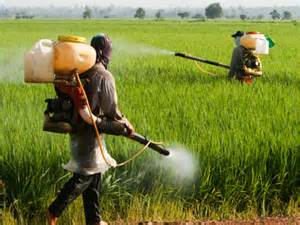Summary: On 1 July, 2016, paraquat AS
exited the Chinese pesticide market, though, in mid-July, the MOA has not yet
issued any official legal documents about re-classifying paraquat as a highly
toxic substance. It means that the toxicity of paraquat is still consistent
with the one registered in the ICAMA.

Source: Bing
Paraquat AS has been officially banned from
the Chinese pesticide market since 1 July, 2016, according to the No.1745
Announcement issued by China's Ministry of Agriculture (MOA), the Ministry of
Industry and Information Technology and the General Administration of Quality
Supervision, Inspection and Quarantine. However, although some industry
conferences suggested re-classifying paraquat as a highly toxic substance, the
MOA has not yet issued any legal documents about the re-classification as of
mid-July. The toxicity of paraquat is still consistent with the one registered
at the Institute for the Control of Agrochemicals, Ministry of Agriculture
(ICAMA).
Data from the ICAMA show that there are 52
valid paraquat registrations now, of which 49 are moderately toxic, 2 are low
toxic and one is highly toxic. Recycling transportation of paraquat AS and export transportation of paraquat TK/
AS will not been affected by the toxicity.
After the ban of paraquat AS, inventory
disposal, recycle transportation of paraquat AS as well as the sales of
paraquat TK draw high attention. On 6 July, 2016, the Working Group on Product
Management and Social Responsibility Caring of Chinese Paraquat Manufacturers
held a meeting at the China Crop Protection Industry Association, where they
advanced certain measures and suggestions about the future of paraquat.
1. To properly dispose the inventories
After 1 July, all paraquat inventories that
still haven't been sold shall be returned to the corresponding manufacturers
which will be bound to take responsibility and dispose of said paraquat.
Related wholesalers shall gather the products from retailers and distributors so
as to allow manufacturers to transport them to factories. Due to the expertise
and particularity of safe disposal of pesticides, storing paraquat on the spot
or destroying it by melting and burning is not recommended. In the meantime,
related management departments of transportation shall provide convenience for
aforementioned units.

2. To exactly understand the toxicity of
paraquat
Recently, many primary-level law-enforcing
departments treat paraquat as a highly toxic pesticide, which obstacles the
return of the remaining paraquat inventories, its normal transportation as well
as the sales of other paraquat formulations. This also misleads the public and
social opinions. In fact, the MOA just suggested re-classifying paraquat as a
highly toxic substance at the 17th plenary meeting of the 8th National Review
Committee of Pesticide Registration, while not issuing any official
announcements for this decision. At the moment, the MOA is collecting opinions
from relevant departments and the public about this re-classification.
3. To strengthen the production and sales
management of paraquat TK
According to the No.1745 Announcement,
paraquat TK manufacturers are still allowed to produce the product for export.
In order to control the domestic production and use of paraquat AS from the
source, existing TK manufacturers are prohibited to:
-
Sell paraquat TK to domestic formulation enterprises.
-
Expand their production scale.
-
Transfer the production qualification to other manufacturers.
About CCM:
CCM is the
leading market intelligence provider for China’s agriculture, chemicals, food
& ingredients and life science markets. Founded in 2001, CCM offers a
range of data and content solutions, from price and trade data to industry
newsletters and customized market research reports. Our clients include Monsanto,
DuPont, Shell, Bayer, and Syngenta. CCM is a brand of Kcomber Inc.
For more information about
CCM, please visit www.cnchemicals.com or get in touch with us directly by emailing econtact@cnchemicals.com or calling +86-20-37616606.
Tag: paraquat